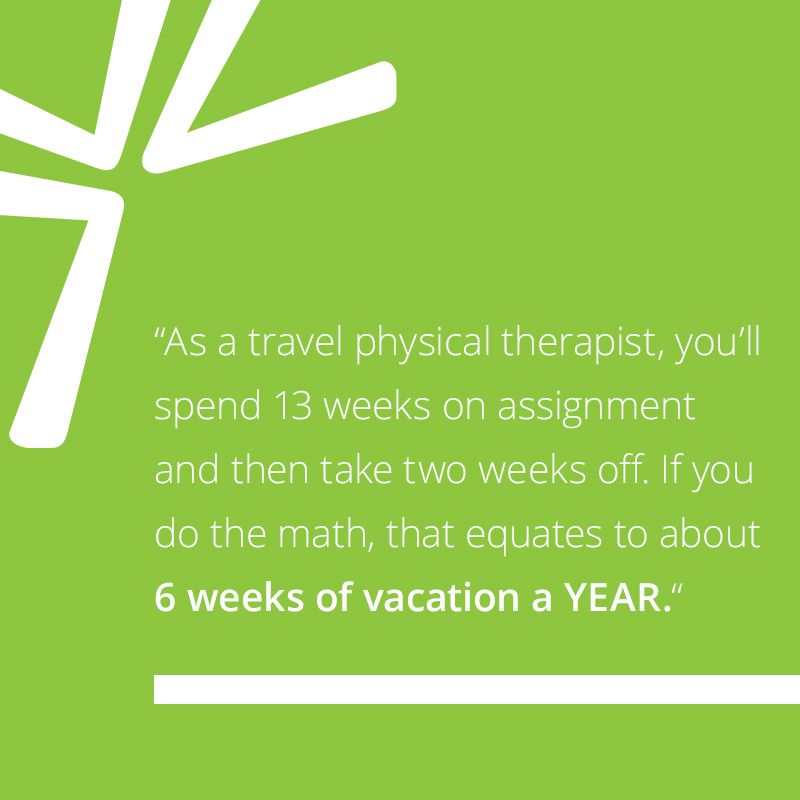Is Ti Easy to Become a Travel Pt
Is a career in travel physical therapy at the top of your list of career considerations as a new grad? If not, it should be!
Keep reading to find out why.
Travel Physical Therapy: The Pros and Cons
Let's begin with the basics: the pros and cons of travel physical therapy.
Pros:
Work/Life Balance
As a travel physical therapist, you'll spend 13 weeks on assignment and then take two weeks off. If you do the math, that equates to about 6 weeks of vacation a YEAR. Not to mention your nights and weekends spent exploring new places.
While other professions may make it difficult to have a work/life balance, being a travel physical therapist makes it easy.

High Demand
The Bureau of Labor Statistics predicts that 247,700 new Physical Therapist (PT) jobs will be created by 2028.
And guess what? Traveling PTs are in even higher demands and include these phenomenal benefits.

Great Pay
With baby boomers aging and snow birds flocking to southern states in the winter, the demand for PTs really does move around the country depending on the season. You can earn the highest paying assignments by following the patients.
Variety of Environments
The most obvious perk of travel physical therapy is the fact that you get to explore every corner of this country.
Some of our favorite benefits include learning more about yourself, uncovering the similarities and differences between cultures, expanding your culinary horizons and honing your ability to make new friends.
Vast Medical Knowledge
A notable perk of travel is just how sharp your skills will get. When you're always on the go, you will inevitably stay ahead of the curve due to working with a variety of professionals while staying on top of new developments and technologies.
Job Satisfaction
Did you know those in a travel profession tend to love theirs more than those in a static position? That's because traveling PTs never get stuck in a rut. They never have the same day twice. And they definitely never caught up in office drama.
Cons:
Licensure Requirements
Just like any medical professional, Physical Therapists must obtain a license in each state they want to practice. PTs must renew that license every two years; this can become slightly tedious for traveling professionals. The good news is, your staffing agency is always happy to help you with any licensing needs as they bring you new assignments.
Distance
There's no sugar coating the fact that travel professionals can miss their friends and family.
Having just graduated, you likely have a core group of college friends to lean on. Choosing to become a travel PT does mean you will miss people while on assignment, but it also means you'll add a bunch of new friends to that core group!
No Salary
As a travel physical therapist, you won't be able to accumulate those yearly pay raises that often come with a salaried position. You will, however, be eligible for even higher paying assignments.
Frequent Moves
If you aren't a huge fan of traveling, having to move from place to place three to four times a year can be a long process.
Do you think travel physical therapy could be right for you? Let's now cover acing your PT interviews so you can snag the perfect assignment.
New Grad Physical Therapy: Interview Tips
Interviews are a nerve wracking process for anyone at any age – if you aren't prepared.
Here are a few interview preparation tips we want to share with you to help ease the nerves:
- Research the company.
- Conduct practice interviews.
- Think about describing your strengths and unique skill sets.
- Review common interview questions and prepare your answers.
With a good handle on interviewing, you're ready to find the perfect job. Let's learn more about that next.
Finding A Good Physical Therapy Job
While your former classmates are stuck in on the job hunt grind, your decision to travel means you'll have no trouble at all finding a good physical therapy job because of your personal recruiter at a staffing agency.
Your staffing agency works diligently to assist with things like:
- Placing you in the perfect assignments for your career and travel goals
- Negotiating competitive pay
- Finding quality housing
- Saving you time by handling outreach and paperwork preparation
- Reducing stress by ensuring you have consistent job security
And if you're looking to find the right recruiter, here are three suggestions:
- Interview at least four recruiters before selecting one.
- Be sure to discuss your goals, your desired perks and any deal-breakers.
- Ask about their success rates for PT placements.
Physical Therapist Salary
Your earning potential as a PT is very, very high. The average salary is $87,930 according to the U.S. Bureau of Labor Statistics.
As a traveling PT, you earn a higher wage and benefit from an abundance of tax breaks to enjoy when you are in a travel position through travel expenses and professional expenses.
Travel Expenses
Here are just a few of the travel expenses you can deduct:
- Airline and public transit costs
- Rental car fees
- Accommodations
- Meals (and tips)
Professional Expenses
And here is a quick look at some of the professional expenses you can deduct:
- Uniforms (plus laundry costs)
- Phone bills
- Internet and computer related expenses
- Licensing and CEUs (in most cases)
With the right assignments and smart expensing, you will be counting those zeroes in no time.
Travel the Country and Earn A Living
As a new grad, isn't it everyone's dream to travel the country? That can all be made possible with you through a career as a travel physical therapist!
Considering travel PT as your career? Get in touch with one of recruiters today.
Source: https://www.masmedicalstaffing.com/blog/why-you-should-become-a-travel-physical-therapist-as-a-new-grad/
0 Response to "Is Ti Easy to Become a Travel Pt"
Post a Comment